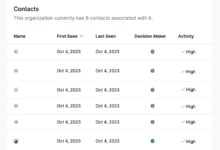CRM Base de Donnee: 7 Powerful Insights for Ultimate Success
In today’s fast-paced digital world, mastering your customer relationships is no longer optional—it’s essential. At the heart of this transformation lies the crm base de donnee, the powerhouse behind smarter decisions, personalized interactions, and scalable growth. Let’s dive into how this critical system can revolutionize your business.
What Is a CRM Base de Donnee?

The term crm base de donnee refers to the structured database at the core of any Customer Relationship Management (CRM) system. It’s not just a digital rolodex; it’s a dynamic, centralized repository that stores, organizes, and manages all customer-related data—from contact details and purchase history to communication logs and behavioral patterns.
Defining CRM and Database Integration
A CRM system without a robust database is like a car without an engine. The crm base de donnee is the foundation that enables CRM software to function effectively. It integrates data from multiple touchpoints—email, social media, websites, call centers, and sales platforms—into a unified view of each customer.
- CRM platforms like Salesforce, HubSpot, and Zoho rely heavily on structured databases.
- The integration allows real-time updates and synchronization across departments.
- Data integrity and consistency are maintained through normalization and validation rules.
Core Components of a CRM Database
A well-designed crm base de donnee includes several key components that ensure functionality, scalability, and usability. These include:
- Customer Profiles: Names, contact information, job titles, company details.
- Interaction History: Logs of emails, calls, meetings, support tickets.
- Sales Pipeline Data: Deal stages, expected close dates, value tracking.
- Marketing Engagement: Campaign responses, email open rates, website visits.
- Custom Fields: Industry-specific data such as contract terms or service preferences.
“The database is the brain of the CRM. Without it, you’re flying blind in customer engagement.” — Gartner Research, 2023
Types of CRM Databases: Operational, Analytical, and Collaborative
Not all crm base de donnee systems are built the same. Depending on business needs, organizations deploy different types:
- Operational CRM Databases: Focus on automating customer-facing processes like sales, marketing, and service. Ideal for day-to-day operations.
- Analytical CRM Databases: Designed for data analysis and business intelligence. They extract insights from historical data to improve strategies.
- Collaborative CRM Databases: Facilitate information sharing across departments (sales, marketing, support) to enhance customer experience.
For example, a retail company might use an operational CRM to track orders, while a financial services firm may prioritize analytical databases to predict client churn. You can learn more about CRM types at Salesforce’s official guide.
Why a CRM Base de Donnee Is Critical for Business Growth
The strategic value of a crm base de donnee extends far beyond data storage. It acts as a catalyst for growth by enabling smarter decision-making, improving customer satisfaction, and increasing operational efficiency.
Enhanced Customer Insights and Personalization
With a centralized crm base de donnee, businesses can create detailed customer personas based on real behavior and preferences. This allows for hyper-personalized marketing campaigns, tailored product recommendations, and proactive service interventions.
- Segment customers by demographics, purchase frequency, or engagement level.
- Trigger automated email sequences based on user actions (e.g., cart abandonment).
- Use predictive analytics to anticipate future needs.
According to a McKinsey report, companies that leverage personalization see revenue increases of 5 to 15%.
Improved Sales Efficiency and Forecasting Accuracy
Sales teams equipped with a comprehensive crm base de donnee can prioritize leads, track deal progress, and forecast revenue with greater accuracy. The database provides visibility into which opportunities are most likely to close, based on historical patterns and engagement metrics.
- Automated lead scoring reduces time spent on unqualified prospects.
- Sales managers can monitor team performance in real time.
- Forecasting models become more reliable with clean, structured data.
“Teams using CRM databases close 29% more deals than those who don’t.” — Nucleus Research
Streamlined Marketing Campaigns and ROI Tracking
Marketing departments benefit immensely from a crm base de donnee by aligning campaigns with customer behavior. Instead of spraying and praying, marketers can launch targeted initiatives and measure their impact precisely.
- Track campaign performance across channels (email, social, paid ads).
- Attribute conversions to specific touchpoints using UTM parameters.
- Optimize budget allocation based on ROI per segment.
Tools like HubSpot integrate seamlessly with CRM databases to provide end-to-end marketing analytics. Learn more at HubSpot CRM.
How to Build an Effective CRM Base de Donnee
Creating a high-performing crm base de donnee isn’t just about choosing software—it’s about strategy, data governance, and continuous optimization. Here’s how to build one that delivers results.
Data Collection: Sources and Best Practices
The quality of your crm base de donnee depends on the sources and methods used to collect data. Common sources include:
- Website forms and landing pages
- Social media interactions
- Email marketing platforms
- Customer service logs
- Point-of-sale (POS) systems
- Third-party data providers (with consent)
Best practices for data collection:
- Always obtain explicit consent (GDPR, CCPA compliant).
- Use double opt-in for email subscriptions.
- Standardize data formats (e.g., phone numbers, addresses).
- Implement CAPTCHA to prevent bot entries.
Data Cleaning and Deduplication Strategies
Dirty data costs businesses an average of $12.9 million annually (IBM). A crm base de donnee must be regularly cleaned to maintain accuracy.
- Run automated deduplication tools monthly.
- Validate email addresses and phone numbers using APIs.
- Remove outdated or inactive records based on engagement thresholds.
- Use fuzzy matching to identify near-duplicates (e.g., “John Smith” vs “Jon Smith”).
Zoho CRM offers built-in data quality tools that help automate this process. Explore them at Zoho Data Quality.
Database Structure: Relational vs. NoSQL Models
Choosing the right database architecture is crucial for scalability and performance.
- Relational Databases (SQL): Ideal for structured data with clear relationships (e.g., MySQL, PostgreSQL). They enforce data integrity through foreign keys and constraints.
- NoSQL Databases: Better for unstructured or rapidly changing data (e.g., MongoDB). They offer flexibility but require careful schema design.
Most enterprise CRM systems use relational models due to their reliability and ACID compliance (Atomicity, Consistency, Isolation, Durability).
Top Features of a Modern CRM Base de Donnee
A cutting-edge crm base de donnee goes beyond basic storage. It integrates advanced features that empower teams and drive innovation.
Real-Time Data Synchronization Across Platforms
Today’s customers interact across multiple channels. A modern crm base de donnee ensures that every interaction—whether via mobile app, live chat, or in-store—is instantly reflected in the system.
- Synchronize with ERP, e-commerce, and support platforms.
- Enable offline access with automatic sync upon reconnection.
- Use webhooks and APIs for seamless integration.
For instance, Shopify integrates with CRM databases to update order status in real time.
Advanced Analytics and Reporting Tools
Data is only valuable when it’s actionable. Modern crm base de donnee systems come with built-in analytics dashboards that visualize key performance indicators (KPIs).
- Track customer lifetime value (CLV).
- Monitor churn rates and retention trends.
- Generate custom reports with drag-and-drop interfaces.
- Export data to BI tools like Tableau or Power BI.
Salesforce Einstein Analytics is a prime example of AI-driven reporting within a CRM database.
AI and Machine Learning Integration
The future of crm base de donnee lies in artificial intelligence. AI enhances data processing, prediction, and automation.
- Predictive lead scoring using historical conversion data.
- Chatbots that pull customer info from the database in real time.
- Natural language processing (NLP) for sentiment analysis in support tickets.
- Automated data entry through voice or text recognition.
Microsoft Dynamics 365 uses AI to suggest next-best actions for sales reps based on database insights.
Security and Compliance in CRM Base de Donnee Management
With great data comes great responsibility. Protecting your crm base de donnee is not just a technical issue—it’s a legal and ethical imperative.
Data Encryption and Access Control
To safeguard sensitive customer information, robust security measures must be implemented.
- Encrypt data at rest and in transit using AES-256 or TLS 1.3.
- Implement role-based access control (RBAC) to limit data exposure.
- Use multi-factor authentication (MFA) for user logins.
- Log all access attempts for audit trails.
Compliance with standards like ISO 27001 ensures data protection best practices.
GDPR, CCPA, and Global Data Privacy Laws
Regulations like the General Data Protection Regulation (GDPR) and California Consumer Privacy Act (CCPA) impose strict rules on how crm base de donnee systems handle personal data.
- Provide customers with the right to access, correct, or delete their data.
- Maintain records of data processing activities.
- Conduct regular data protection impact assessments (DPIAs).
- Appoint a Data Protection Officer (DPO) if required.
Failure to comply can result in fines up to 4% of global revenue. Learn more at GDPR Info.
Regular Audits and Risk Assessments
Proactive security management includes routine evaluations of the crm base de donnee.
- Conduct quarterly vulnerability scans.
- Perform penetration testing annually.
- Review user permissions and deactivate inactive accounts.
- Backup data daily and test recovery procedures monthly.
Tools like Splunk can monitor database activity for suspicious behavior.
Choosing the Right CRM Platform for Your Database Needs
Not all CRM platforms are created equal. Selecting the right one depends on your business size, industry, and technical requirements.
Cloud-Based vs. On-Premise CRM Solutions
The choice between cloud and on-premise impacts scalability, cost, and maintenance.
- Cloud CRM: Hosted by providers (e.g., Salesforce, HubSpot). Offers lower upfront costs, automatic updates, and remote access.
- On-Premise CRM: Installed locally. Provides full control over data and customization but requires IT infrastructure.
SMBs often prefer cloud solutions, while large enterprises with strict compliance needs may opt for on-premise.
Scalability and Customization Options
Your crm base de donnee should grow with your business.
- Choose platforms that allow modular upgrades (e.g., adding marketing automation).
- Ensure API availability for third-party integrations.
- Support for custom objects and workflows.
- Multi-language and multi-currency capabilities for global expansion.
Oracle CRM offers deep customization for complex enterprise needs.
User Experience and Training Requirements
Even the most powerful crm base de donnee fails if users don’t adopt it.
- Prioritize intuitive interfaces with minimal learning curves.
- Offer role-based dashboards (sales, marketing, support).
- Provide comprehensive training programs and documentation.
- Use gamification to encourage consistent usage.
HubSpot Academy offers free CRM training to boost user proficiency.
Common Challenges and How to Overcome Them in CRM Base de Donnee Implementation
Despite its benefits, implementing a crm base de donnee comes with hurdles. Recognizing and addressing these early is key to success.
Data Silos and Integration Issues
One of the biggest obstacles is fragmented data across departments.
- Sales, marketing, and support often use separate tools, creating silos.
- Solution: Use middleware like Zapier or MuleSoft to connect systems.
- Establish a single source of truth with master data management (MDM).
Integration ensures that the crm base de donnee remains accurate and complete.
Poor User Adoption and Resistance to Change
Employees may resist using a new CRM due to fear, lack of training, or perceived complexity.
- Involve end-users in the selection process.
- Highlight time-saving benefits and automation features.
- Appoint internal champions to drive adoption.
- Start with a pilot group before full rollout.
According to PwC, 56% of CRM projects fail due to poor user adoption.
Maintaining Data Quality Over Time
Data decay is inevitable—emails bounce, people change jobs, phone numbers expire.
- Schedule regular data audits (quarterly or bi-annually).
- Implement automated validation rules upon data entry.
- Use third-party enrichment services like Clearbit or Hunter.io.
- Encourage users to update records after every interaction.
A clean crm base de donnee ensures reliable reporting and effective outreach.
Future Trends Shaping the CRM Base de Donnee Landscape
The evolution of crm base de donnee is accelerating, driven by technological innovation and changing customer expectations.
AI-Powered Predictive Analytics
Future CRM databases will not just store data—they’ll anticipate needs.
- Predict customer churn before it happens.
- Recommend optimal pricing based on buyer behavior.
- Automate customer segmentation using clustering algorithms.
Google’s Contact Center AI is already using predictive models to route calls efficiently.
Blockchain for Secure and Transparent Data Management
Blockchain technology could revolutionize crm base de donnee security by providing immutable, transparent records.
- Ensure data authenticity and prevent tampering.
- Enable customer-controlled data sharing via decentralized IDs.
- Facilitate secure B2B data exchanges.
While still emerging, companies like IBM are exploring blockchain-CRM integrations.
Hyper-Personalization Through IoT and Behavioral Data
As Internet of Things (IoT) devices proliferate, CRM databases will ingest real-time behavioral data.
- Smart home devices can signal product usage patterns.
- Wearables provide health insights for insurance or wellness companies.
- CRM systems will trigger personalized offers based on real-time triggers.
Imagine a fitness brand sending a discount when a user’s smartwatch detects reduced activity.
What is a CRM base de donnee?
A CRM base de donnee is the centralized database within a Customer Relationship Management system that stores all customer-related information, enabling businesses to manage interactions, analyze behavior, and improve service delivery.
Why is data quality important in a CRM database?
Poor data quality leads to inaccurate reporting, failed campaigns, and lost revenue. A clean, up-to-date crm base de donnee ensures reliable insights and effective customer engagement.
How does AI enhance a CRM database?
AI improves a crm base de donnee by automating data entry, predicting customer behavior, enabling chatbots, and providing intelligent recommendations for sales and marketing teams.
Can small businesses benefit from a CRM database?
Absolutely. Even small businesses can leverage a crm base de donnee to organize customer information, automate follow-ups, and scale operations efficiently without hiring large teams.
What are the best practices for securing a CRM database?
Best practices include encrypting data, using role-based access control, complying with privacy laws like GDPR, conducting regular audits, and training employees on data security protocols.
The crm base de donnee is no longer a back-office tool—it’s a strategic asset that drives customer-centric growth. From enhancing personalization to enabling AI-powered insights, a well-managed database empowers businesses to stay competitive in an increasingly data-driven world. By understanding its components, addressing implementation challenges, and embracing future trends, organizations can unlock the full potential of their customer relationships. Whether you’re a startup or a multinational corporation, investing in a robust CRM database is not just wise—it’s essential for long-term success.
Further Reading:



